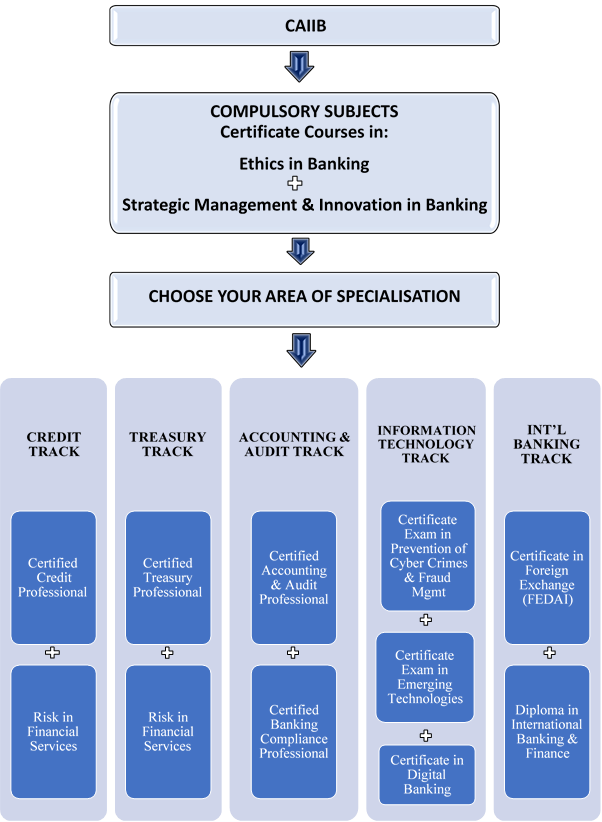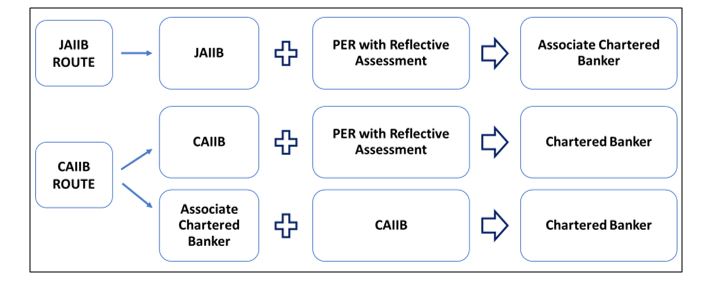Introduction of the Professional Banker qualification.
Banking functions are becoming more specialised. Therefore, a banker, apart from
having a general knowledge of banking operations, needs to acquire specialised knowledge
in different verticals to remain competitive and be ahead of the curve. Most of
the banks have created dedicated verticals in risk, credit, treasury, international
banking etc. Many verticals in a bank have interlinkages with other verticals. For
example, risk is an integral part of credit and treasury management. Hence, an officer
handling the credit or treasury function in a bank needs to know about the nuances
of risk management also. Thus, acquiring knowledge of interlinked verticals will
help you in acquiring knowledge in specialized areas as well.
In order to meet the twin objectives of bridging the skill gaps and having a system
of continuous professional development, a gold level aspirational qualification
called “Professional Banker” has now been introduced by the Institute. This qualification
is open to candidates who have five years’ experience and seeks to create a pool
of professionals in specialized and inter-linked verticals to enable them to meet
emerging challenges. A chart depicting the Professional Banker qualification is
given below for your reference.

Introduction of a new certificate course
A certificate course on “Resolution of Stressed Assets of Banks, with special emphasis
on the Insolvency & Bankruptcy Code 2016” has been introduced by the Institute.
IBBI is the knowledge partner for this course.
The certificate course aims to develop among banking professionals and employees
an understanding of the Code, procedure to be followed for resolution of stressed
assets, role of bankers in an insolvency resolution process under the Code and to
further strengthen their capacity to discharge their duties and responsibilities,
including commercial decisions with utmost care and diligence, in the best interests
of all stakeholders. As management of NPAs including its resolution is a critical
activity in banks, this certificate course will help bankers in enriching their
knowledge on the subject.
The examination on the subject is conducted at increased frequencies in the remote
proctored mode.
Introduction of additional certificate courses
The Institute will also be introducing two new certificate courses on:
- Strategic Management & Innovations in Banking
- Emerging Technologies
The first exams on the above subjects has been tentatively scheduled to be held in October 2021.
E-learning
Presently, the Institute offers e-learning covering some of the important courses
/ subjects like JAIIB, CAIIB, Credit Management, MSME, International Trade Finance,
AML/KYC, Prevention of Cyber Crimes and Fraud Management, IT Security, Diploma in
International Banking & Finance etc. We are also in process of developing new
e-learnings on other contemporary topics like Treasury, Risk Management etc.
Joint certification programme by IIBF with XLRI on Leadership
Development Programme
The Institute has tied up with XLRI for developing and co-branding of a program
on soft skills involving leadership / team building with an emphasis on banking
professionals at the mid-level.
The objective of the programme is to transform good managers in banks into effective
leaders, with a human centric approach. The first batch of this programme will start
on 24th July 2021.
Joint certificate programme with Jamnalal Bajaj Institute of Management Studies
(JBIMS) on Advanced Strategic Management for Top Executives of Banks/FIs
IIBF caters to all important verticals in banks through its wide-ranging training
programmes specially designed for the officers working at different levels such
as new entrants, Junior/Middle Management and Senior Management. However, in order
to tread the path to reach the pinnacle, a need was felt to develop a high value,
short duration programme for the Top Management Executives of Banks in the area
of Strategic Management and Leadership.
In order to have such a high quality; high-end programme, the Institute will be
collaborating with Jamnalal Bajaj Institute of Management Studies (JBIMS), one of
the reputed management institutions affiliated to University of Mumbai, for delivering
a short duration Management Development Program on “Advanced Strategic Leadership”
for Top Executives of Banks, Financial Institutions and NBFCs.
The objective of the programme will be to enable the top executives of banks to
have a compelling vision, enhance their capacities to formulate and execute strategies
and lead their organizations across geographic boundaries by anticipating the future
and acquiring a competitive advantage.
The details of the programme will be announced shortly.
Training Programmes
The Advanced Management Programme (AMP), one of the flagship programmes of the Institute
which is conducted in collaboration with IIM Calcutta has been well accepted by
the banking fraternity. The Institute commenced its 10th batch of the Advanced Management
Program (AMP) on 6th June, 2021. The 10th batch of the program
was inaugurated virtually by Mr. Rajkiran Rai G, President, IIBF and Managing Director
& CEO of Union Bank of India. The AMP programme is designed with a focus on
building leadership capabilities at Banks & Financial Institutions.
Besides the AMP, the training vertical of IIBF conducts niche programmes covering
different functional areas of the banks. New programmes on MSMEs, Agricultural Financing
have also been drawn up by the Institute. The Institute has state of the art studios
at its offices at Mumbai, Kolkata and New Delhi. This has enabled trainings to be
conducted in the virtual mode in a seamless and effective manner.
The Institute has devised customized training programmes for various Banks to cater
to their specific needs. The purpose of customized training programmes is skill
upgradation to make the employees ready to deliver on those skills
Research Activities
The Institute has received good response in the following research schemes:
- Micro Research
- Macro Research
- Diamond Jubilee and CH Bhabha Banking Overseas Research Fellowship (DJCHBBORF)
- Scheme for Research in Banking Technology (Jointly with IDRBT)
The results of these schemes will be shortly announced by the Institute.
Collaboration with GARP, USA
IIBF has entered into a MoU with the Global Association of Risk Professionals (GARP),
USA for offering the Financial Risk & Regulations (FRR) program to JAIIB or
CAIIB holders at a preferential rate of USD 300. The FRR program gives an overview
on core aspects of Risk Management viz Credit Risk, Market Risk, Operational Risk
and Asset & Liability Management (ALM). The registration window will be
open until July 31, 2021 after which, the details of registered candidates will
be shared with GARP, USA.
I am happy to state that the collaboration by IIBF with GARP has seen an encouraging
response among the bankers.
Collaboration with Chartered Banker Institute
On 27th June 2017, IIBF had entered into a Mutual Recognition Agreement (MRA)
with the Chartered Banker Institute offering a pathway for the Certified Associates
of the Indian Institute of Bankers (CAIIB) from India to have their qualifications
recognized by the Chartered Banker Institute, and be able to become Chartered Bankers
by studying the Chartered Banker Institute’s Professionalism, Ethics &
Regulation module, and successfully completing a reflective assignment.
Taking forward this MRA, a pathway has now been made available for the Junior Associates
of the Indian Institute of Bankers (JAIIB) to also acquire the Chartered Banker
Status through the JAIIB Professional Conversion Route.

The JAIIB Professional Conversion Route has also seen a good response.
Lastly, I would appeal to all to please stay safe and healthy by taking appropriate
precautions and by following the advice provided by your local health authorities.
With warm regards,
Biswaketan Das
22nd July 2021.
 e-Learning
e-Learning
 Apply Now
Login
Apply Now
Login



